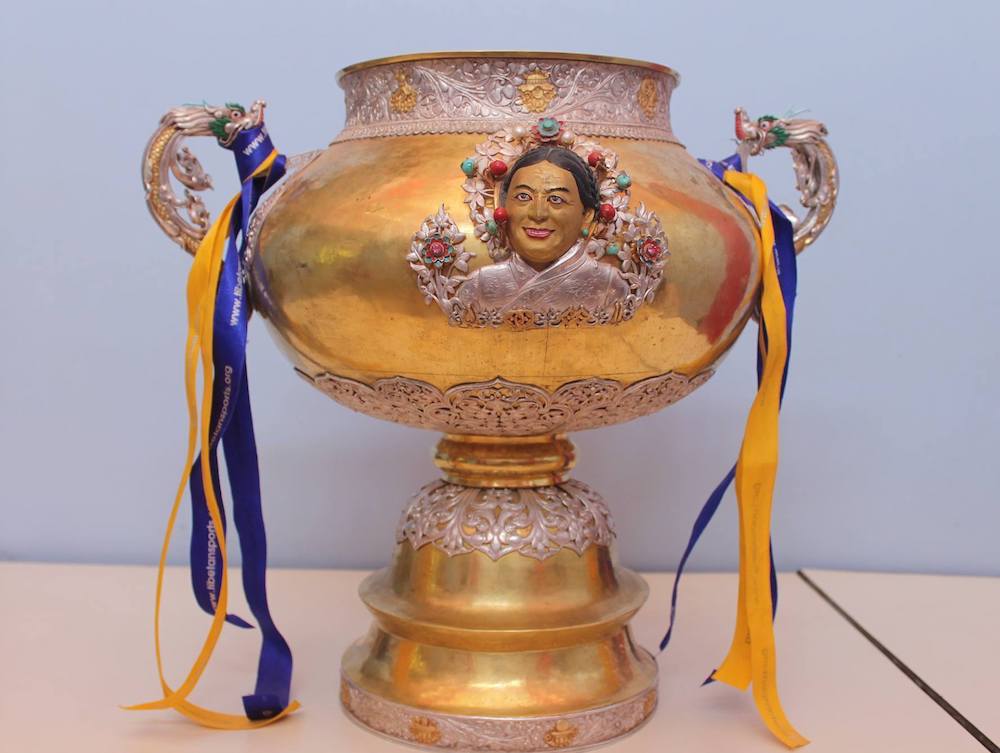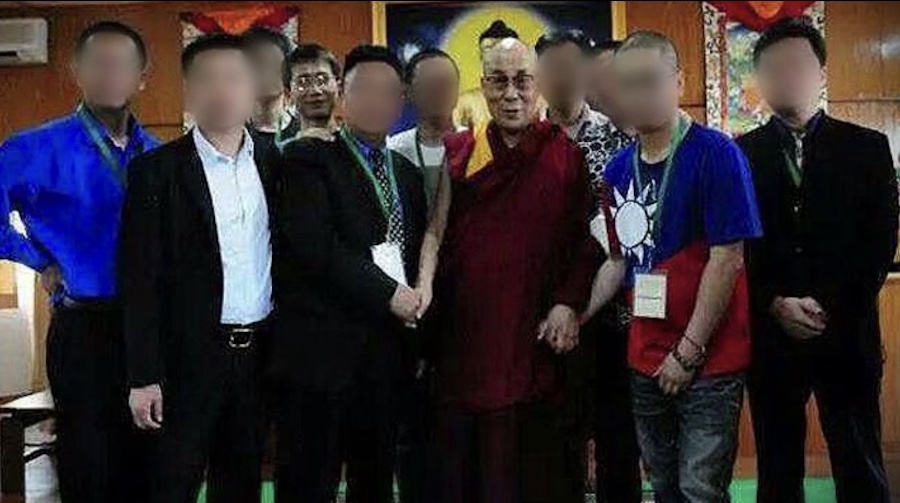 By MARY BETH SMETZER, Staff Writer
By MARY BETH SMETZER, Staff Writer
Draping the length of his unfastened watch over the microphone in imitation of a dangling body, Tibetan Lama Palden Gyatso spoke of brutal episodes of horrific torture to the high school students filling the chapel at Monroe Catholic High School Tuesday morning.
Gyatso was imprisoned by the Chinese military for 33 years after protesting the Chinese invasion of Tibet.
The monk took out his false teeth, holding them aloft on a tissue for all to see, and displayed the roughened texture of his tongue–both the result of being tortured with an electric pole.
Gyatso said his false teeth were a gift from Amnesty International.
“I really like these teeth,” he said. “There is a human being who took my teeth and then there is another human being who give me my teeth.
“One human being takes things and the other human being, through sympathy and affection, makes teeth for you.”
Gyatso, author of “Autobiography of a Tibetan Monk,” is in Fairbanks this week speaking on human rights and survival of the human spirit.
His talk today at 7 p.m. at Schaible Hall on the University of Alaska Fairbanks campus is titled, “Thirty-three Years in a Chinese Prison–Human Rights in Tibet,” and is sponsored by Amnesty International and the Tibet Committee of Fairbanks.
During his many years of imprisonment, Gyatso said he received a lot of inspiration from the elderly prisoners who were dying “left and right.” “They said, if you ever escape … do something.”
This is the monk’s 26th trip to the United States in his quest to intercede for the people of Tibet.
“From the beginning, my purpose is to educate people on what happened in Tibet, to people like myself. … So many people in Western Europe and America do not know that Tibet was a separate nation and our government went through tremendous tragedy through the brutal force of the Chinese.
“Freedom is such a natural love for everybod; as a human being I must work for freedom.”
A photograph of Gyatso taken in 1995, three years after he was released from prison, was passed around at a pre-lecture interview Tuesday. It showed an extremely thin, gaunt-faced man.
Today, the outward appearance of the small-statured monk is markedly improved, but the more than three decades of brutal imprisonment and torture he suffered under the Chinese military have left indelible imprints upon his mind, body and soul.
“These unthinkable tortures are still happening today,” he told the student assembly through interpreter Rigdzin Tingkhye.
“Inside Tibet, so many people have died. Sometime they kill you by bullet. … They go back to the family and say you have to pay for five bullets or for the rope.
“I have sometime no words to express behavior like that.”
Gyatso lost all 39 members of his family after the Chinese invasion.
Born in 1931, Gyatso became a monk at age 10, and was 28 years old in 1959 when the Chinese invaded his country. He was initially imprisoned for participating in a peaceful demonstration protesting the Chinese invaders and sentenced to seven years. After an attempted escape, he was resentenced to 15 years, followed by a hard labor camp and subsequent arrest without benefit of legal defense until he was released in 1992. He escaped to India shortly afterward.
Gyatso said he survived the inhumane conditions because of his youthfulness and skill in finding something to eat. He even cooked the leather of his shoes.
Prisoners were only given one bowl of soup per day.
“It (soup) was so clear, he could see his own face in the bowl of soup,” Tingkhye translated.
“We were so hungry,” Gyatso continued, that whenever the prisoners were let outside for exercise or any other reason, they would eat leaves, grass and insects.
“Anything that could give you nourishment,” Gyatso said.
Interrogations were always intense and painful. Prisoners were forced to kneel on sharp stones and broken glass, the monk explained.
“Do you still proclaim Tibet as an independent nation?” was the question his captors posed.
“When we don’t accept, and they beat us. They would take off your clothes, dangle you on a rope and beat you … throw hot water on slowly and the skin sheds, or light a fire beneath and literally barbecue human beings.”
Tortures and techniques were changed and different size electrical poles, heated to a bright red, were placed on bare skin.
The descriptions of losing bodily control and of the many men and women who died as a result of the torture brought tears to the eyes of many in the audience.
“Not many people survived … Most women have died.
“It seems like they don’t have any notion of what they do,” Gyatso said of his torturers.
During torture sessions, Gyatso said he practiced tonglen, which is giving and receiving.
“You are receiving the anger and hatred and exchanging it with your love and compassion to that ignorant person who is torturing you.
“Whatever I learned (as a monk) I put into process during my severe torture,” he explained.
Gyatso said he holds no personal hatred or animosity against any individual Chinese or even the person who tortured him.
Tuesday, Gyatso told the students that there are similar injustices all over the world today. He told the students how fortunate they are, not only for the freedom they enjoy but for the opportunity to study whatever they like.
“You should not waste your time, but be very fruitful and have respect for your country … pay sincere respect to your teachers, elders and parents for this opportunity and for the best outcome for the future.”
Gyatso urged the students to continue their studies to become “powerful people” so that they could make a contribution to global peace someday.
At the conclusion of the talk, several dozen Monroe students lined up to offer thanks and shake Gyatso’s hand. Each was warmly embraced by the smiling monk.
In addition to tonight’s lecture, Gyatso will speak and offer blessings at several other events and faith services through Sunday. For more information call Neville Jacobs, 456-4780 or Wayne Jex at 456-4812.
Mary Beth Smetzer can be reached at msmetzer@newsminer.com or 459-7546.









